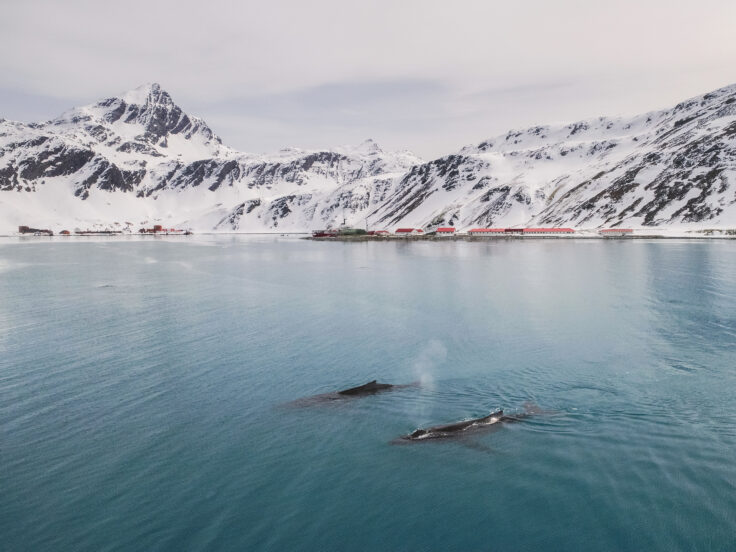A new study shows the welcome return of humpback whales to the waters around the sub-Antarctic island of South Georgia after centuries of commercial whaling decimated their populations. The study is published in the journal Endangered Species Research this week (Thursday 5 November) and is good news for whale conservation.
A team, led by British Antarctic Survey (BAS), focused on the large and charismatic southern right and humpback whales. Both species were heavily exploited by whaling; southern right whales primarily in the 1800s and humpback whales a century later. Since 2013, large groups of humpback whales have been regularly reported in South Georgia waters, confirming their return to this historical centre of whaling. Southern right whales have been sighted in the area for over 20 years and sightings remain steady over time, in contrast to the growing numbers of humpback whales.

South Georgia was a key whaling site from the early 1900s until the cessation of whaling, with over 170,000 whales killed in local waters. Humpback whales were the first to be exploited (1904-1920), followed by fin and blue whales. The whaling industry collapsed at South Georgia in the 1960s, as whale numbers decreased and whales virtually disappeared from South Georgia waters.
Whale ecologist and lead author Dr Jennifer Jackson from BAS says:
"This is a really positive step forward for humpback whales. Population surveys show that both humpback and southern right whales are slowly recovering from whaling in the Southwest Atlantic. At South Georgia, it seems as if a small proportion of the southern right whale population feed here, while humpback whales have just started. It will be interesting to see how these trends continue in the coming years".
In 2018, a British Antarctic Survey boat expedition studied the population biology of southern right whales at South Georgia, to identify population linkages between South Georgia and the winter calving grounds off Brazil, Argentina and South Africa, to assess their feeding preferences, and to carry out a health check on individual whales, measuring their body condition. Researchers also analysed decades of sighting records of whales, provided to the local South Georgia museum by visitors and expeditioners.
Dr Jackson continues:
"Results from the expedition showed that southern right whales are in good health. Photographs of individuals were examined, with some showing that animals had healed wounds from kelp gulls. These wounds show that the whales visited calving grounds at Peninsula Valdes, where kelp gulls regularly peck the backs of young whales."
Local sightings reports show steady numbers of southern right whales with stable group sizes since the 1990s; this is despite a rapid increase in visitor numbers over time with an associated increase in sightings effort. Humpback whale sightings remained steady until 2013, after which sightings were more frequent, and reported group sizes were larger.
Project co-investigator and geneticist Dr Emma Carroll from University of Auckland, New Zealand, says:
"South Georgia is an area of remarkable biodiversity, which has taken decades to recover from the impacts of human activity. The first wave of recovery was by fast-reproducing species such as seals and penguins, and now we see that the humpback whales are recovering and returning to feed in the food-rich waters. I'm hopeful that the slower reproducing and recovering whale species like blue and southern rights will follow this trend in future."
Led by British Antarctic Survey, the South Georgia Wild Water Whales project has been funded by an EU BEST Medium grant, the Darwin Initiative, South Georgia Heritage Trust, Friends of South Georgia Island and the World Wildlife Fund, with support from the Government of South Georgia and the South Sandwich Islands.
The research collaboration involved the following institutes: University of St Andrews, Cooperative Institute for Climate, Ocean, & Ecosystem Studies, Federal University of Juiz de Fora (Brazil), International Fund for Animal Welfare, Smithsonian National Museum of Natural History, University of Southern Denmark, Instituto Aqualie, the National Oceanic and Atmospheric Administration, Woods Hole Oceanographic Institution, Australian Antarctic Division, Scottish Association of Marine Science, University of Utah, University of Pretoria, Projeto Franca Austral, Happy Whale and the University of Auckland.
Have whales returned to a historical hotspot of industrial whaling? The pattern of southern right whale Eubalaena australis recovery at South Georgia by Jennifer A. Jackson1,*, Amy Kennedy2, Michael Moore3, Artur Andriolo4,5, Connor C. G. Bamford1,6, Susannah Calderan7, Ted Cheeseman8,9, George Gittins10, Karina Groch11, Natalie Kelly12, Russell Leaper13, Matthew S. Leslie14, Sarah Lurcock15, Brian S. Miller12, Jessica Richardson16, Vicky Rowntree17,18, Patrick Smith10, Emilie Stepien19, Gabriele Stowasser1, Phil Trathan1, Els Vermeulen20, Alexandre N. Zerbini2,5,21,22,23, Emma L. Carroll24,25 is published in the journal Endangered Species Research here






